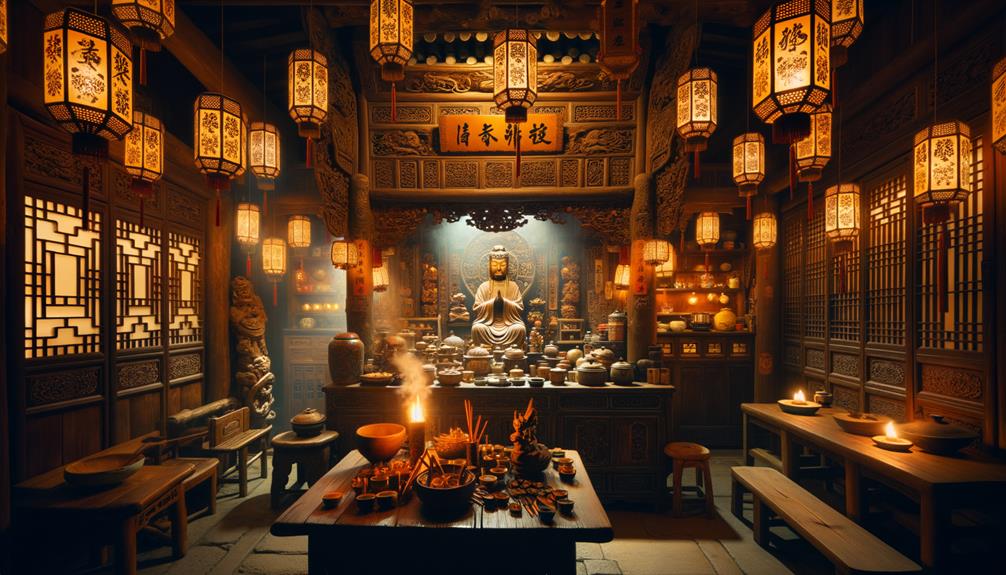Let's unveil the captivating narrative of Zao Jun, the Kitchen God. Once a mere mortal named Zhang Lang, he sank into hopelessness, selling his wife in desperation. Yet, profound remorse and an eventual reunion paved his path to redemption, transforming him into a divine guardian of home and hearth. Annually, he journeys to the Jade Emperor, reporting on families' virtues, symbolizing atonement and ethical values. In kitchens everywhere, his image stands as a reminder of forgiveness, protection, and abundance. Through rituals and offerings, families honor his watchful presence, upholding moral integrity. Dig deeper, and his tale grows richer, unfolding layer by layer.
Origins of Zao Jun
Zao Jun's story emerges from ancient Chinese folklore, where ordinary individuals like Zhang Lang transform into venerated figures. Zhang Lang's tale fascinates me the most. Once a common man, Zhang Lang's life spiraled after selling his wife out of desperation, haunting his conscience. His eventual reunion with her underscored the redemptive power of love and forgiveness – core Chinese values.
Picture Zhang Lang's plight: poverty driving him to an unthinkable act, selling his wife, only to regret it deeply later. When they reunited, his remorse exemplified the struggles we all face and the redemption possible through moral conduct and strong family bonds. Zao Jun's deification reminds us that even in our darkest moments, upholding ethics and cherishing loved ones can lead to extraordinary personal growth.
Zhang Lang's transformation from a flawed mortal to the Kitchen God Zao Jun isn't just about elevating a man to godhood. It symbolizes the timeless human quest for redemption, the importance of familial love, and the perseverance required to overcome life's trials. These ancient narratives underscore values that still resonate today.
Key Legends
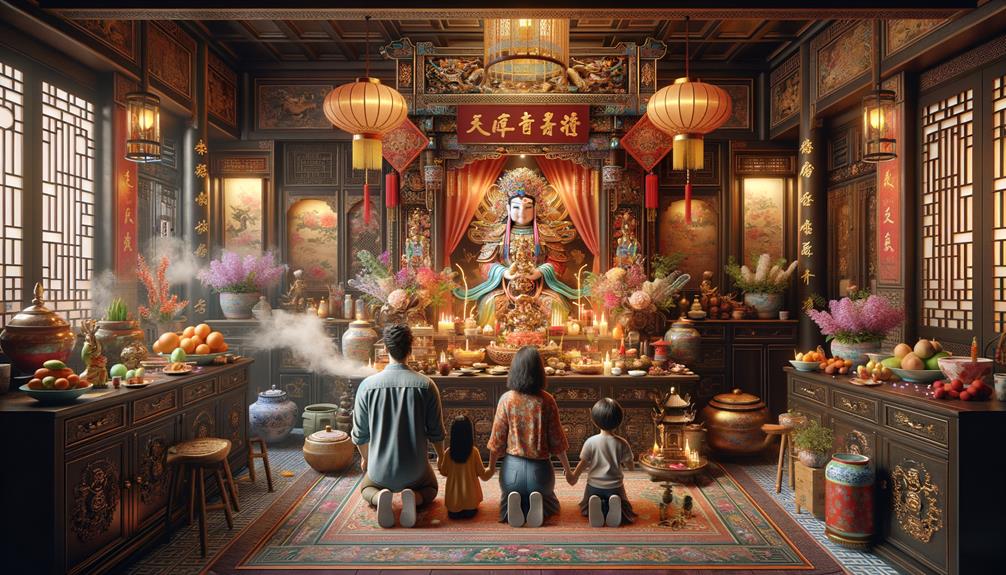
The stories surrounding the Kitchen God reveal timeless lessons about our capacity for change and devotion to family. One gripping tale focuses on Zao Jun's transformation from a wasteful man who abandoned his wife to a respected deity. Though initially Zao Jun lived a life lacking virtue, compassion from his former wife sparked a profound shift within him, resulting in his ascension as the Kitchen God.
- From an immoral person to a revered figure.
- An act of kindness igniting redemption.
- Zao Jun's rise to divine status.
- Underscoring moral values and familial bonds.
Over generations, these myths have highlighted different aspects of Zao Jun's journey and character. At their core, they emphasize redemption, righteous conduct, and the enduring importance of family – making the Kitchen God a central symbol in Chinese households.
Rituals and Practices
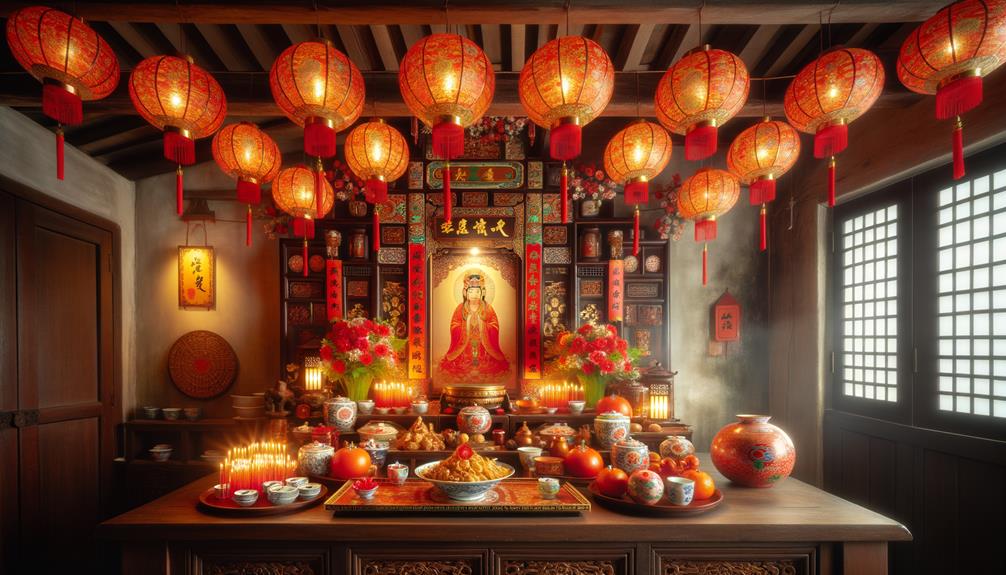
Let's talk about the rituals that honor Zao Jun, the Kitchen God, and how families embrace these traditions in their daily lives. When Little New Year arrives, households go through a cleansing ritual, sweeping away the old year to welcome the new. Zao Jun takes center stage as incense burns and food offerings transform the kitchen into a sacred space. These practices symbolize respect for morality within the family.
Paper effigies of Zao Jun hang above the fireplace, tangible reminders of his presence. Replacing them annually signifies the continuous cycle of renewal and moral reflection. By making sacrifices and offerings, families uphold ethical standards, ensuring Zao Jun's spirit thrives, guiding them towards righteousness and harmony.
Symbolism and Meaning
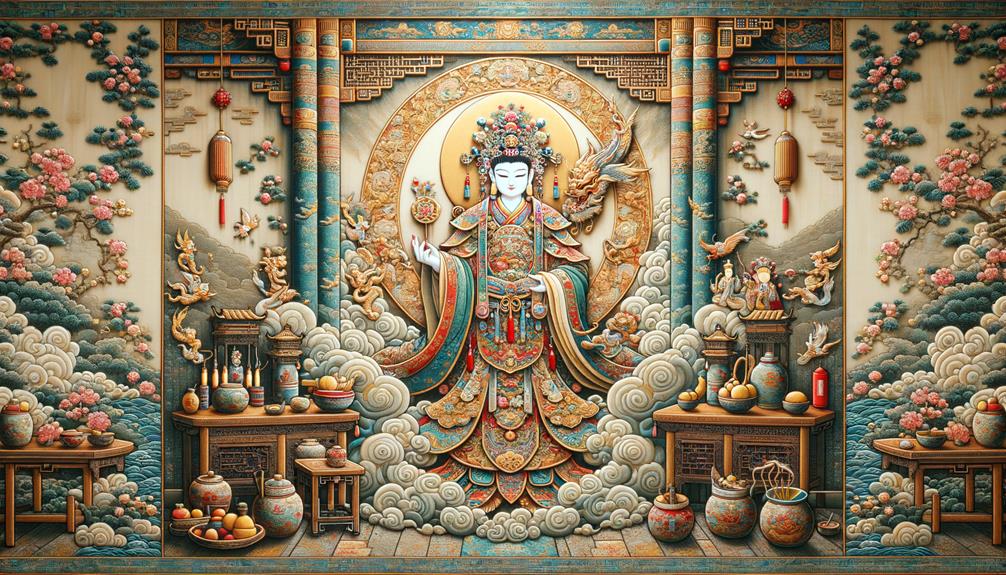
Zao Jun, the Kitchen God, holds immense cultural relevance in every Chinese home. He embodies guardianship and moral guidance, ensuring protection, prosperity, and harmony through age-old rituals and offerings. His annual journey to report to the Jade Emperor highlights timeless themes – loyalty, family unity, and seeking divine blessings.
The mythic figure's journey underlines the significance of traditions, cementing his role as a pillar of Chinese culture. His presence fosters a sense of belonging, reminding us of cherished values handed down through generations. Though ancient in origin, Zao Jun's symbolism remains deeply woven into the fabric of modern Chinese society, a testament to its enduring spirit.
Cultural Significance Explained
Zao Jun, the Kitchen God of Chinese mythology, stands as a heartwarming symbol of family bonding and ethical living. The yearly ritual of burning his paper effigy isn't just tradition; it's a reminder to uphold moral principles within the home. Zao Jun embodies unity and righteousness, transcending myth to become a cultural touchstone.
His presence in the kitchen fosters domestic peace and order. As a spiritual guardian, Zao Jun promotes virtuous conduct, prosperity, and goodwill among loved ones. This ancient tale beautifully intertwines family togetherness with ethical values, weaving a timeless narrative that guides households toward harmony.
Zao Jun symbolizes the close-knit bonds that tie families together. His role emphasizes moral uprightness, serving as an invisible overseer of righteousness in daily life. Through this mythical figure, Chinese culture celebrates the importance of a harmonious household rooted in virtue.
Traditional Offerings Rituals
In the heart of every household, we pay tribute to Zao Jun, the Kitchen God, through solemn rituals interwoven with age-old traditions. Our offerings and gestures resonate with deep symbolic meaning, honoring the deity and seeking his favor for a prosperous year ahead.
The ritual commences with painstakingly crafted rice flour dumplings, a culinary expression of our devotion. Wafting incense bridges the earthly and celestial realms, beckoning Zao Jun's presence. Burning stove scriptures and paper effigies is more than mere custom; it is a symbolic farewell, ensuring the deity's safe journey to the heavenly court.
We smear honey on Zao Jun's image, a sweet gesture imploring him to speak kindly of our deeds before the Jade Emperor. As fireworks illuminate the night sky, they celebrate the occasion while also aiding the Kitchen God's ascent to the celestial realm.
Annual Festival Celebrations
As the annual festival draws near, our homes transform into sacred havens, filled with rituals honoring Zao Jun, the guardian of our hearths and hearts. This period marks a journey of reflection and renewal, a chance to secure the Kitchen God's blessings and protection for the coming year. Our actions carry deep symbolism and meaning.
- Cleaning the home and kitchen purifies our living spaces, welcoming Zao Jun.
- Offerings of food, incense, and sweets aim to please the Kitchen God, ensuring a favorable report to the Jade Emperor.
- Burning the paper effigy signifies the Kitchen God's departure to the celestial realm.
- Reflecting on family morality encourages evaluating our conduct and seeking improvement.
These customs and rituals aren't mere acts; they're sacred rites connecting us to the divine. The offerings, from the simplest treats to the most elaborate dishes, symbolize our reverence. Burning the effigy symbolically sends Zao Jun to relay our family's virtues and flaws to the celestial court. Each gesture, every ritual, guides our collective journey under the Kitchen God's guardianship toward a year blessed with harmony and prosperity.
Depictions in Art
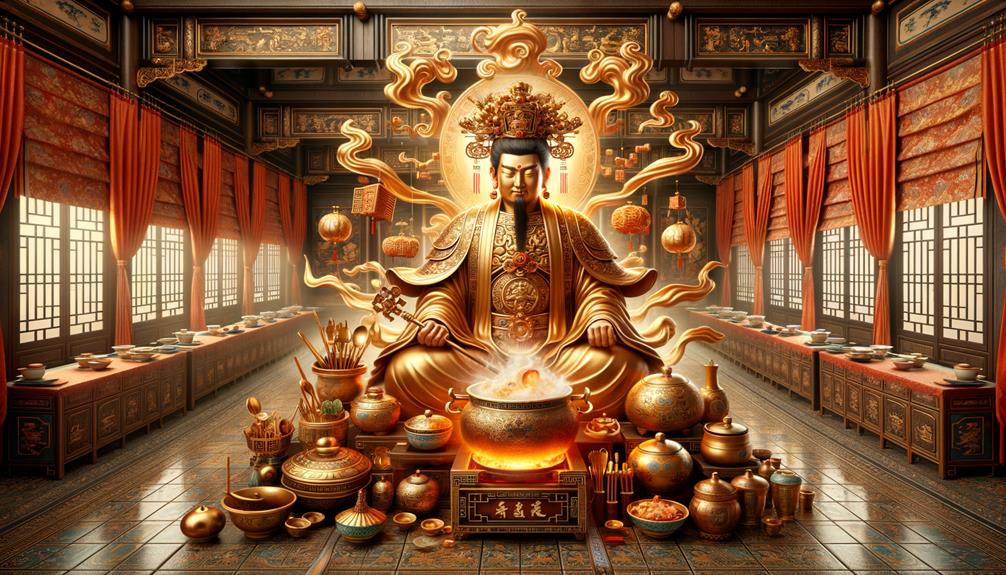
When exploring artistic depictions of Zao Jun, you'll often find him dressed in traditional Chinese official robes. His lengthy beard and scholar's cap portray an aura of knowledge and authority. From classic paintings to modern artists like Doreen Yen Hung Feng's interpretations, his image symbolizes the eternal pursuit of transformation and guardianship. Each portrayal, whether his solemn journey to the Jade Emperor or intimate moments with his wife, captures the timeless essence of his mythological role.
Traditional Chinese Paintings
Traditional Chinese paintings brilliantly capture Zao Jun, the Kitchen God adorned in ceremonial garb – a symbol of his divine role overseeing households. These artworks immerse us in rich Chinese folklore, each brushstroke narrating a tale of reverence and tradition.
Artists depict Zao Jun with a lengthy beard and mustache, often accompanied by his wife, reflecting the harmonious balance of their duties. The stove or hearth surrounding him emphasizes his pivotal position as a household deity vigilantly safeguarding the family's well-being.
Painters like Doreen Yen Hung Feng have exquisitely illustrated Zao Jun, encapsulating his essence within Chinese culture. These visuals transcend artistic expression, offering glimpses into ancient customs and beliefs.
The ceremonial robes signify Zao Jun's esteemed status among household deities. His lengthy facial hair symbolizes wisdom gained through experience. The stove highlights his connection to the home's core. His wife's presence underscores the importance of family and partnership in mythology.
These paintings immortalize Zao Jun's enduring legacy, a reflection of his sacred role in Chinese lore.
Modern Artistic Interpretations
From traditional Chinese paintings' timeless strokes, we witness Zao Jun's rebirth in contemporary art, where he stands resplendent in official robes and a scholar's cap – a guardian deity reimagined for today's world. These artworks present Zao Jun's presence as both familiar and fresh, embodying his eternal role as the Kitchen God while reflecting evolving modern aesthetics.
In some pieces, Zao Jun appears with his wife or a young lover, adding layers of intimacy and familial bonds to his portrayal. These variations highlight his significance within households, spotlighting universal themes of protection and care. The styles range widely, influenced by diverse cultural currents, yet always circling back to his core identity as the kitchen and family's guardian deity.
artists today interpret Zao Jun in myriad ways:
| Element | Modern Artistic Interpretations |
|---|---|
| Attire | Official robes, scholar's cap |
| Companions | Often depicted with wife or young lover |
| Role | Guardian deity of the kitchen and family |
| Artistic Styles | Varied, influenced by diverse cultural elements |
| Significance | Highlights his ongoing relevance in contemporary households |
Through these modern lenses, Zao Jun's mythic journey continues, ever-watchful over the sacred heart of the home.
Influence in Modern Culture
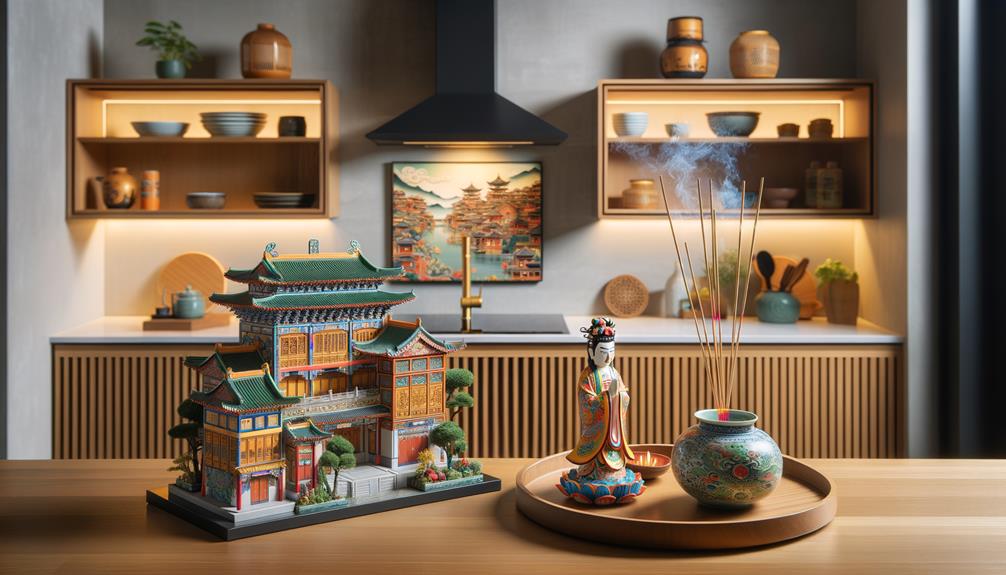
In today's households, ancient Chinese legends intertwine with modern living. As the Lunar New Year approaches, families incorporate the Kitchen God, Zao Jun, into their celebrations. Sweet offerings aim to bring blessings for the year ahead, a ritual rooted in tradition yet embraced by contemporary families.
The legend of Zao Jun endures, his image gracing kitchens through posters or statues. These displays aren't mere decorations; they symbolize the lasting ties between past and present. Offerings like sweets continue during festive times, highlighting the cultural significance of family, home, and hearth. Regional folklore enriches Zao Jun's story, weaving a diverse tapestry.
For many households, the Kitchen God remains an ever-present guardian, embodying timeless themes of protection and prosperity. His presence underscores the enduring value placed on cultural heritage in modern life.
Frequently Asked Questions
Who Is Zao Jun in Chinese Mythology?
Zao Jun, once an ordinary person, became the Kitchen God in Chinese folklore – the guardian deity overseeing domestic harmony and prosperity. Each year, he informs the Jade Emperor about family affairs, embodying a symbolic role that upholds moral values and unity within households.
What Is the Myth of the Kitchen God?
The Kitchen God myth revolves around a flawed mortal ascending to divine status, tasked with reporting on household conduct to a higher celestial figure. At its core, the narrative highlights the importance of moral behavior, loyalty, and family unity – actions have consequences. The storyline follows a classic hero's journey archetype, exploring themes of redemption through the transformation of a mortal into a deity.
What Is the Kitchen God Ritual?
I burn the Kitchen God's effigy, sending it skyward with sweet offerings and firecrackers – a ritual to ensure he reports favorably to the heavens. With his new image hung above the stove, I welcome his presence back into my home.
Who Is the Kitchen God in Ancient China?
In ancient China, the Kitchen God, once a mortal named Zhang Dan, safeguarded family bonds and ethical conduct, reporting to the celestial Jade Emperor. His folklore highlights the significance of familial unity, moral uprightness, and divine reverence. As a guardian spirit, he played a pivotal role in preserving cultural values within households.

